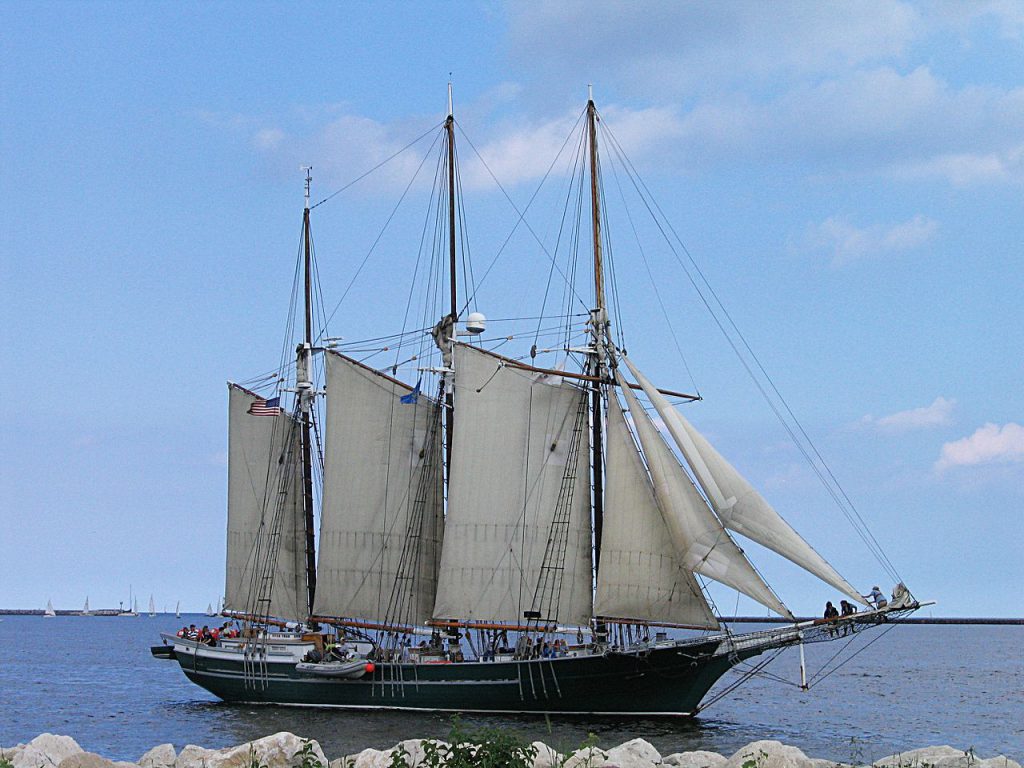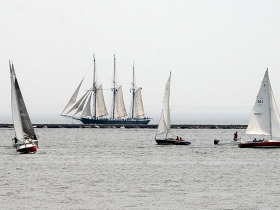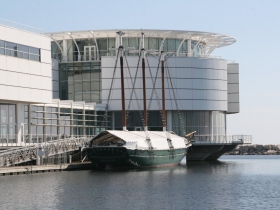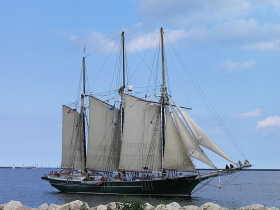S/V Denis Sullivan Seeks New Captain
Milwaukee ship inspired by 19th century lake schooners hasn't sailed since 2019.

The S/V Denis Sullivan. Michael Pereckas from Milwaukee, WI, USA, CC BY 2.0 via Wikimedia Commons
Many places are hiring, but few if any would allow you to sail the Great Lakes and be transported back in time.
Yes, it’s a rare job: Discovery World is seeking a captain for the S/V Denis Sullivan, the organization’s three-masted schooner.
The nonprofit Discovery World is looking for a new, full-time captain to restart the ship’s operation. The role reports directly to organization CEO Bryan Wunar and is responsible for all operations of the vessel from programming to maintenance. A candidate with experience running the deck and managing the crew of a tall ship is desired.
The Denis Sullivan vessel, inspired by that of the Great Lakes cargo schooners of the 19th century, has a 95-foot-high mast. It was completed in 2000 and includes a host of modern amenities including two diesel engines, computer workstations and modern navigation equipment. The 137-foot-long ship can accommodate up to 60 people on day sails and 31 overnight, including its crew.
Pre-pandemic, the ship was regularly used for everything from lake sails for families to multi-day educational trips for teens. A crew of volunteers helps maintain the vessel alongside paid Discovery World staff. It previously had at least one additional full-time crew member and a number of seasonal employees. The captain is responsible for coordinating all of those different pieces. A Discovery World representative told Urban Milwaukee that a focus is being placed on finding a new captain who will contribute to the future direction of the operation.
The ship is currently docked, with a protective cover over its deck, at its regular home at Pier Wisconsin, 500 N. Harbor Dr. While it regularly sailed until the pandemic, it has not sailed beyond the Great Lakes in more than a decade.
Pay for the new captain is to be commensurate with experience according to the job posting. Certification requirements including STCW-95 safety certification, at least a 100-ton U.S. Coast Guard master captain’s license and an Able Seaman’s deck rating.
Those with the proper qualifications can apply for the job on the Discovery World website.
Photos
If you think stories like this are important, become a member of Urban Milwaukee and help support real, independent journalism. Plus you get some cool added benefits.
























Re: Requirements include STCW-95 safety certification, at least a 100-ton U.S. Coast Guard master captain’s license and an Able Seaman’s deck rating.
It would be interesting to learn about how these requirements are acquired. Where can applicants obtain a 100-ton tallship in order to practice?
sbaldwin001 – How to become a Ship Captain….
To be a ship captain requires several steps to gain appropriate education and experience relevant to the position. The U.S. Coast Guard regulates the training and licensing of maritime occupations in the U.S. and elsewhere in the world, the International Maritime Organization regulates educational and licensing standards. Each organization has a limited number of schools approved to train and prepare for the licensing exam. Qualifications for the licensing exam include earning a four year Bachelor of Science degree, with coursework in meteorology, navigation, and cargo management. After meeting these qualifications and passing a licensing exam, candidates may find work as a deck officer or third mate on board a ship.
The process of working up the ranks of the crew is strictly outlined in terms of time served as certain members of the crew. Once qualified to act as the third mate, a year of service is required to become the second mate. After becoming the second mate, another year of service, 13 weeks of classes, and the passing of multiple examinations are required to graduate to chief mate. And similarly, after becoming the chief mate, one more year of service is required to qualify for the master of vessels licensing, a vital step to becoming a ship captain.
The military provides a second avenue in training to eventually become a ship captain, and often provides on-the-job training for lesser positions, such as officers, quartermasters, and ship operators. Training through the military typically requires a period of committed service and potential combat duties, following completion of the training period.
Whether training is obtained through academic or military experience, the U.S. Coast Guard requires anyone who intends to seek a maritime occupation to receive further licensing. A Transportation Worker Identification Credential (TWIC) must be approved and certified through the U.S. Department of Homeland Security. Certification through the International Maritime Organization will require similar security credentials from the candidate’s intended country of occupation. While it is not a requirement for entry-level seamen, a person seeking higher priority positions on a ship must also receive a Merchant Mariner Credential (MMC) to be qualified for the job.
Beyond the basic outlined educational experience and licensing, becoming the captain of a ship also requires work experience and certain other licenses. A potential captain must be licensed to operate the particular size and type of boat they intend to supervise, and must have completed licensing in basic first aid and CPR training. Depending on the employer, they must also have logged a certain number of hours on a ship, and pass vision, drug, and physical screenings.